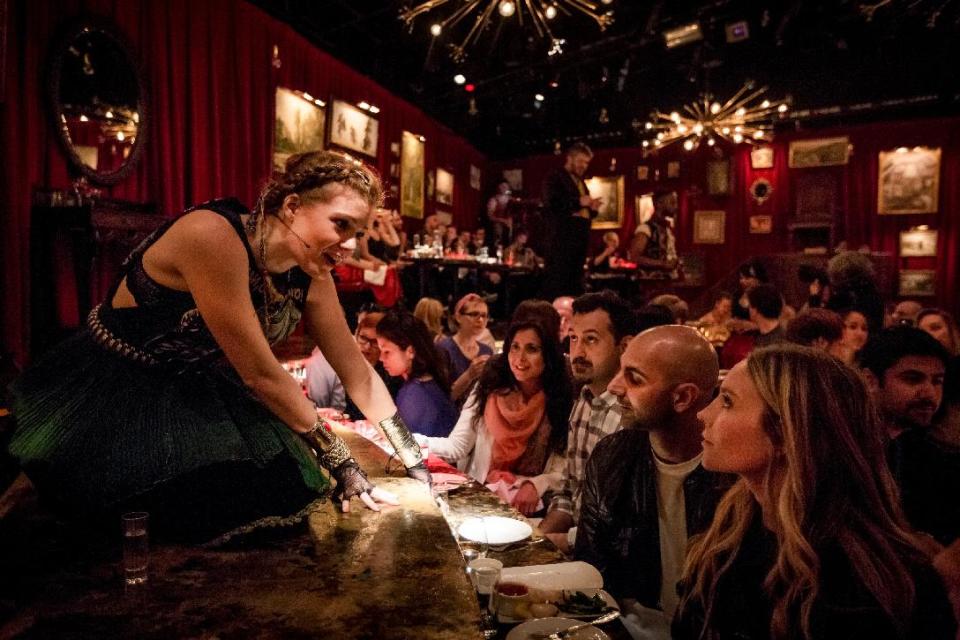Review: Musical using Leo Tolstoy a messy thrill
NEW YORK (AP) — What do you get when you take a 70-page melodrama at the center of "War and Peace" and turn it into a musical? Now layer dance music onto the traditional Russian folk music. Now put it in a tent. While you're at it, throw in a meal and strobe lights.
What you get is the thrilling and yet cluttered musical "Natasha, Pierre & the Great Comet of 1812" — a feast for the senses and an assault at the same time. Dinner theater has never seemed as un-dusty.
The sung-through musical premiered at New York City's Ars Nova in a seven-week run last year before finding a new 6,000-square-foot space in the meatpacking district. It opened Thursday.
Befitting the ultra-cool neighborhood's roots, the show packs so much in that it feels overstuffed — snowflakes fall, strobe lights pulse, actors race about and smoke pours. It sometimes drags, the food isn't as well integrated into the show as it could be, and it often feels like an art project run amok.
And yet there's no denying that creator, composer and performer Dave Malloy has crafted a daring piece of theater. It just needs some editing.
Each ticket comes with a full Russian-themed meal — borscht, dumplings, brown bread, pickled vegetables, chicken and salmon — and a glass of wine or a cocktail. There's a full bar in back.
After the food is cleared, the 360-degree show begins. It centers on a bright young thing, Natasha, who falls for one man, only to be seduced later by another. The 16-person cast encourages you to follow the various turns of the thick plot via helpful program notes.
The show reaches for an immersive experience by trying to erase the line between audience and performer. You may find yourself asked to pass along a love letter, caressed by a pretty young thing, temporarily share a table with an actor or watch a shot of vodka slammed down on your table by a drunken soldier.
Malloy's songs are stunning in their breadth. While the music careens from Russian folk to thumping house beats to proto-rap, the lyrics are similarly establishing an uneven tone, slipping from heart-wrenchingly un-ironic — "I love him/I love him" — to the almost mockingly helpful — "In 19th century Russia, we write letters."
The addiction to recitative and use of descriptive passages grows weary and sometime seems just plain odd — "I throw my fur coat on my shoulders/Unable to find the sleeves," one character sings, as he finds the sleeves. Also it's unclear if Leo Tolstoy actually wrote the immortal line, "Shut your damn mouth!"
The lack of consistency in lyrics and music may be cool but it also acts as something of a coolant. With so many styles and sounds, it's hard to get invested in the show, no matter how good the performances are.
And they're good: As Natasha, Phillipa Soo, a recent Juilliard graduate, is simply a wonder, a delicate beauty with a strong emotional voice. She's almost as pretty as Lucas Steele, a strong singer and actor with Vogue model poses who triggers electronica whenever he appears.
Malloy as Pierre may not have the greatest voice, but he compensates by unleashing the force of his acting to devastating effect. (Plus, he wrote the show, so the kid stays in the play.)
The rest of the cast fully commits, never breaking character over the 2½-hour show. Costume designer Paloma Young mixes simple, beautiful period gowns and army uniforms on the featured actors, while dressing the ensemble in punk versions.
Some moments are thrilling — an opera-within-the musical that employs slow motion to hilarious effect is a sweet bit of stagecraft. And the cumulative song structure of the prologue — "Sonya is good/Natasha is young/And Andrey isn't here" — is a perfect stage-setter. Brittain Ashford also delivers a tingling "Sonia Alone" simply standing in a spotlight.
Choreographer Sam Pinkleton and Rachel Chavkin, the director who also manages the musical staging, use every available inch of Mimi Lien's ingeniously designed set and the audience's attention is always swiveling. Members of the eight-piece band are stashed in various pockets of the 199-person space and well led by Or Matias.
It is sensational, high-stakes stuff, especially as the room between tables is tiny and the speed the actors are moving is quick. Plus, there's alcohol flowing. Somehow, all the actors find themselves under Bradley King's complicated and myriad lights perfectly in synch, even if that's in your startled lap.
It's a show that gets so close, and yet so far.
___
Online:
http://www.thegreatcometof1812.com





